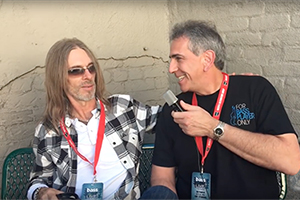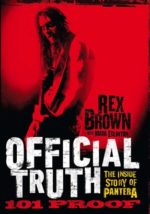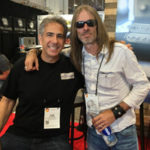Former Pantera bassist shares details of his second solo record
Exclusive interview with FBPO’s Jon Liebman
October 7, 2019
Texas native Rex Brown is best known as the longtime bassist for heavy metal band Pantera, as well as being a member of Down and Kill Devil Hill. He is currently hard at work on a new, as-of-yet untitled solo release, following up 2017’s Smoke on This. Rex’s autobiography, Official Truth: 101 Proof – The Inside Story of Pantera, was released in 2013.
FBPO: So, tell me about the new record you have in the works.
Rex: We finished tracking in, like, May. I guess I started writing around August of last year. We had a bunch of stuff on there from the writing sessions. The whole structure with this record was to… look, I never like to go in and make the same record twice. You’ve got to reinvent yourself every fucking record, or you’re not even touching your artistry or your musicality. As you can tell, this is a little more mature, so I think I came up with four or five, six things that we did, and I came back in November. You gotta remember, man, I was on the road for 27 years of my life. That’s, like, more than half. So you have to grow up around 17, 18, and then from there, you’re on the road for 27 years. It’ll do a doozy to you, man.
FBPO: You seem to have developed a rhythm for going on the road versus staying home.
Rex: I think that sometimes people just don’t understand that you gotta live a little bit of life, and I guess, in 2014 or ’15, I just got off the road, I just had enough. I had enough of the hustle, the business, everything else. And so I was doing the first record, I was trying to wear all the hats and, you know, those tracks came out good, the record did great, whatever. I played quite a few gigs overseas, and I just didn’t want to tour the states because I hate going and playing covers. Now I feel like I want to go on the road. It’s been long enough.
FBPO: Do you have a title for the record yet?
Rex: I do, but I don’t want to put that out yet, ‘cause it’s probably not going to come out till the spring. We’ll just call it Album #2 for now, Solo Album #2.
FBPO: How does it compare to Smoke on This?
Rex: Before, I was writing with a buddy, (and) we would put these songs together. I’d had a bunch of stuff that I wanted to record, and it was kind of scattered all over the place. It was great for getting me out there and doing what I’m doing. On a good eighty-five to ninety percent of this (record), I wrote every fuckin’ lick. I really worked hard with my producer on this, and I really let him produce me.
FBPO: What was the recording process like?
Rex: After I added all these other tracks, we went back and kind of listened to what we did. We re-recorded the drums, we re-recorded the bass. I found this case that had been shipped to me. Many basses were around, a bunch of Spectors. We started kind of like playin’ with which ones sound great, which one’s gonna sound great for this record. You know, each song kind of dictates itself. I spent a little time on the bass, I think fretless. It’s probably on about eight songs out of the twelve tracks on the record. Going back, I used to be able to play fretless perfectly.
FBPO: That seems like a departure for you. I mean, you’re not really known as a fretless player.
Rex: Fretless is always that challenge for me. I think for any bass player. I had to really go back and study it. But I was looking for more tone. What’s the song need? Does it need that slur there? I don’t like doing (this), but I went back and listened to a couple of my favorite records from like the late ‘80s. Pino Palladino’s my favorite bass player. I just love the way he plays fretless. You know, you listen to those Don Henley records and stuff like that. It’s timeless. Anything he played on is pretty much timeless. It’s not Jaco. I’m not into that. Look, Jaco was great. I make no bones about it. I’m more of a meat and potatoes guy. I’m not a (Billy) Sheehan, definitely not a Jaco. Without taking any credit from those guys, they’re very talented individuals. I’m just not one of those players. My role in Pantera for twenty-odd years was to lock down with that kick on that bass drum. With the fretless, you can withstand different tonality stuff. I think when we came back, we had most of the fretless already recorded. Then I came back and really nailed down the stuff that didn’t need fretless.
FBPO: What other gear did you use on this record?
Rex: In some of these tracks, we found this one Spector that I never in a million years would have played on a record. My producer loved the sound of it, and we just slapped it through a DI and then went into an old SVT Pro 2 and into one of these cabinets that Jonas Hellborg and I built, like four of five years ago. It had like 200-watt 10s with the big magnets on them, from Celestion, and we stuck them in Hans’ (Hans-Peter Wilfer’s) Warwick cabs, which I think are great! They had that old Acoustic 360 baffle in between. Most producers these days just use DIs, and that’s all they want, put it through their little box, or whatever. I’m not a fan of that. I’m still a fan of a live kind of sound. I used a lot of Spectors on it, I used a Yamaha BB on a couple of songs, my trusty old Thunderbird that I’ve had. It’s a 1971 we completely redid. We used a bunch of stuff that I’m no longer endorsing. It just depends on what the instrument lends to whatever the track needs.
FBPO: Which Warwick models do you play?
Rex: They built me so many of those fuckin’ things! I’ve got a Corvette that’s just totally badass. I’ve got my signature, that upside down “Destroyer” looking thing, the “Explorer,” that sounds amazing! We came out last year with Seymour Duncan active/passive quarter pounders that are on my signatures, and those have done really well. I’m always in search of the sound.
FBPO: It sounds like you went kind of “old school” with this record. The studio, the setup…
Rex: Motown Acme is the brand that put this out. The DI that they had on the old Motown board, like what James Jamerson and everybody else were just plugging straight into. It’s got an attenuator, so you can switch back and forth. But it’s got something inside that little box, man, that sounds a-fucking-mazing! We didn’t go through any Avalons or anything like that. We just got the sound of the wood, basically. On the last record, I used the Warwicks through the Tech 21 rackmount stuff and that was good for what it was, but I find that sometimes if you just go direct into a smokin’ amp, you can get the sound that you want. I kind of went back to basics on this. I haven’t really thought about it. It’s like this is what it is. We’re putting intros and outros, and some of these songs lead into each other now. I hooked up with some really cool cats that are marketing this thing in L.A. and around the world. There’s not a metal song on this fuckin’ record. There’s a preconception that this is a metal record. This is more (of) what I wanted to do for a long time.
FBPO: I had no preconceptions. I was ready for anything!
Rex: Right! You never know. I mean there are some crazy, fuckin’ killer tracks on this thing. I brought in (some) anthemy-style just fuckin’ crazy stuff. I really spent a lot of time going back and forth. We cut the drums in basically six hours, so the guy did thirty-six tracks in six hours, meaning we needed three per track. We did twelve tracks. And this kid came in, just fucking amazing! You know, that’s a lot of work. I’m still using the same producer that I used on the last record. We took everything out of his top living space above the studio, it’s got a real bright sound. It has hardwood floors. It sounded so much better than it did in the studio, where it gets damp, you know, it doesn’t ring, and I kinda wanted that. We gated the shit out of this record. That was our intention. Let it bleed a little bit, you know what I’m sayin’?
FBPO: How much guitar did you play, in addition to bass?
Rex: You know, as far as the guitars, man, a lot of stuff is there on tape. I had a couple guys come in and play. I think there’s maybe five leads on this record. I played all the other guitars. But that came as a second thought. I was more concerned about the bass and making sure that that was heavy. (For) the other stuff that we had, I used tiny little amps. I didn’t use any big amps at all. You know, your little twelve-inch Fenders, single twelves. It sounded really good. There’s quite a few songs that have 12-string on them, (that) me and my producer played. This cat can play anything.
FBPO: Caleb Sherman, right?
Rex: Yeah.
FBPO: Who else is on the record?
Rex: Kevin Bond. A friend I’ve known forever from the New Orleans era of my life. Just a super good friend. Lance Harvill, that was with me on the last record. He was part of the writing, but just in spurts. He wasn’t there the whole time, so he didn’t play a lot of guitar on that. He played, I wanna say, about three leads on the record. So, it’s just basically me and my producer. We did everything. And so, when I went back in May, we had eighteen days, and I went and I re-recorded all the bass, all the vocal, except for the tracks that we had before. Those sounded fine. I gave myself three days of pre-production, just so I could make sure I had these tones. And I really felt this more of not the guitar setup, but more of the bass setup, trying to get the best sounds that we could for that, because I thought that was lacking on the first one. When I went back and picked up the guitar in 2014, you know, I played guitar all my life (but) I’m known to be the bass player of Pantera, and it’s not a bad gig. At the same time, you can get stuck in that pigeonhole, “Well, that’s all he can do.” No, that’s not all I can do. I can do all kinds of shit. I play piano on this record.
FBPO: You played the tuba, didn’t you?
Rex: Not on that record!
FBPO: [Laughing] No, not on the record. I mean…
Rex: You don’t put tubas on fuckin’ rock & roll records.
FBPO: You’d be the first!
Rex: [Laughs] Well, there’s actually a couple of songs where if we would add one, I could have laid it down, you know? I’ve got one sitting at home in Texas, an old baritone. I picked it up, but I hardly blow into it any more. You gotta get some serious air goin’. I still love playin’ guitars. It’s all I do. I sit around, I’ve got a million guitars. You name one, I’ve got it.
FBPO: How about your basses? Are you pretty well done with your 5-strings?
Rex: No, in fact, I played 5-string on a couple of tracks on this record. It was fun.
FBPO: What about your technique? Did you use your fingers very much, or was it mostly pick?
Rex: I used my fingers a lot on this record. I really did.
FBPO: What about on the fretless? I mean a pick and a fretless don’t really seem to go together, in my mind anyway, but I suppose they could.
Rex: No, but sometimes if you use a thin pick with a fretless, and just roll the tone back, you can get where you’re going, even though I don’t like using that. I use my fingers on all the fretless stuff. It’s just the way it feels. It feels so natural. I think because I was on the road for so long, and you’re just bangin’ out the same fuckin’ metal hard-core shit.
FBPO: I would assume in your solo projects, you have more control over the mix, unlike the old Pantera days, where the bass was somewhere between Dimebag’s fat guitar and Vinnie’s reverb-laden snare drum?
Rex: But that’s what made it good! I went through so many companies back in the day, just trying to find that sound. Like, the first few records with Pantera were played on Charvel Jacksons, you know? And they sound like cardboard boxes because the reverb on the snare was so loud, and the low end on Dime’s guitar, we were playing pretty much everything in unison, (and) you just wanted the extra, you know, you wanted the octave below. And then I played Music Mans for a couple years. Hans sent me one of the (Warwick) Thumb basses, in about ’93 or ’94. And then I found Spector, and the Spectors really cut through, (with) the woody tone. And the way Stuart (Spector) made those old ones, I don’t know how they are now, because I haven’t played any new ones, but it fit. You could finally hear the bass on the third record. Finally, on that last record, man, you could hear the bass completely! It was just trial and error.
FBPO: Are you going to be doing any touring to promote the new record?
Rex: Absolutely, man! I haven’t been on the road in four or five years. I’m gonna go out for four or five months and see what happens. I’ve got a really super cool agent now. We’ll see where it takes us. I’ve been getting offers, and offers, and offers, and offers, (but) I hadn’t felt like doing it because if I don’t have enough material, I’m not gonna play covers.
FBPO: How about another technique question? We’re getting more and more well known for our online bass lessons here at FBPO. What advice can you impart to our students?
Rex: The first knee-jerk thing that comes out of my mouth is to start with their very first memory of listening to the bass line, and going back and learning their first favorite song that they (remember well). There’s all kinds of great instruments out there. You don’t have to buy the most beautiful instrument to learn how to play. I would say start out where a 13- or 14-year-old today would start out, even though these guys probably have a lot more money. I think it’s kind of imperative that you start from the basics. And of course, knowing the scales. That’s what you have to learn first. You have to learn the scale for every single note that goes up. You just gotta pick it up and, trial and error. If you like playing with your fingers, play with your fingers. If you like playing with a pick, pick’s a lot easier, but a pick is also used for different things. If you want a brighter sound, I can play with both. I used to be a jazz player, so early on, when I was 17, 18, (I played) those kinds of gigs. So, I guess it all comes around into a circle. It is life itself. We don’t know why it changes, or why it does what it does. We got our peaks and valleys and, by God if you didn’t, you’d just be a boring son of a bitch.
See Jon’s blog, with key takeaways from this interview, here.
Smoke on This is available here:
Official Truth: 101 Proof – The Inside Story of Pantera is available here:







